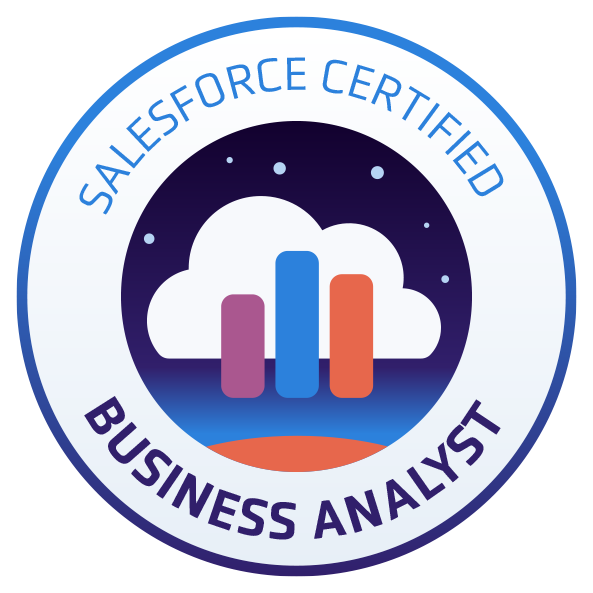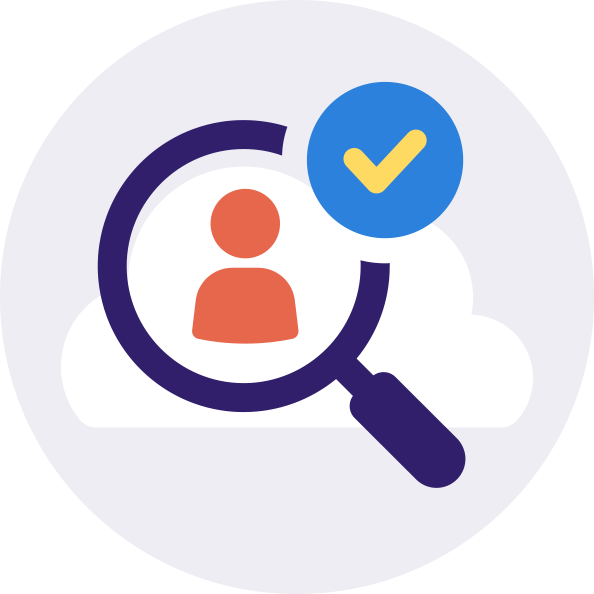
Career Spotlights
Salesforce
Business Analyst
How much do Business Analysts make?
of Business Analysts are satisfied with their salary, down from 56% in our previous survey
What factors impact your earning potential as a Business Analyst?
| Important | Neutral | Unimportant | |
|---|---|---|---|
| Years of technical experience with Salesforce | 93% | 6% | 0% |
| Years of experience in IT | 81% | 16% | 3% |
| Salesforce certifications | 81% | 10% | 10% |
| Exposure to large projects | 80% | 19% | 0% |
|
Becoming a Salesforce product specialist (e.g. working with Salesforce Industries [Vlocity], CPQ, FSL, Sales and Service Cloud) |
78% | 13% | 10% |
| College/University degree(s) | 68% | 10% | 22% |
| Specific vertical industry experience | 55% | 45% | 0% |
| Working with AI | 51% | 35% | 13% |
Years of technical experience with Salesforce
| Important | Neutral | Unimportant |
|---|---|---|
| 93% | 6% | 0% |
Years of experience in IT
| Important | Neutral | Unimportant |
|---|---|---|
| 81% | 16% | 3% |
Salesforce certifications
| Important | Neutral | Unimportant |
|---|---|---|
| 81% | 10% | 10% |
Exposure to large projects
| Important | Neutral | Unimportant |
|---|---|---|
| 80% | 19% | 0% |
Becoming a Salesforce product specialist (e.g. working with Salesforce Industries [Vlocity], CPQ, FSL, Sales and Service Cloud)
| Satisfied | Neutral | Dissatisfied |
|---|---|---|
| 78% | 13% | 10% |
College/University degree(s)
| Important | Neutral | Unimportant |
|---|---|---|
| 68% | 10% | 22% |
Specific vertical industry experience
| Important | Neutral | Unimportant |
|---|---|---|
| 55% | 45% | 0% |
Working with AI
| Important | Neutral | Unimportant |
|---|---|---|
| 51% | 35% | 13% |
What steps should you take to become a Business Analyst?


Education
In terms of what you might need, 68% of Salesforce Business Analysts hold at least a Bachelor’s degree. However, only 29% consider a degree is needed to work with Salesforce, while 68% consider a degree to be an important factor in increasing earning potential.


Certification
Salesforce certifications are a great way to learn about other areas of the platform, as well as helping to verify your existing skill set to potential employers.
When it comes to Business Analysts, 87% are certified, while 81% of those respondents believe that having a certification makes you a more valuable candidate.
Salesforce now offers a certification specifically for Business Analysts, which is great news for those wanting to learn the foundational skills involved in the role and show off their knowledge. The Certified Business Analyst certification validates that you can use your understanding of business needs, your ability to capture requirements, and your stakeholder collaboration skills to support the development of Salesforce solutions that meet unique business requirements.
What Salesforce certifications do Business Analysts hold?
Roles that can lead on to becoming a Business Analyst
Some of the more common roles people have before pursuing a career as a Business Analyst include:
- Data Analyst
- Data Scientist
- Business Systems Analyst


What skills and experience should a Business Analyst have?
Technical skills for Salesforce Business Analysts
- Salesforce platform expertise: Deep understanding of Salesforce core functionalities, including Sales Cloud, Service Cloud, and other modules
- Business process mapping: Ability to document and analyze existing business processes
- Data Analysis: Proficiency in data analysis tools and techniques to identify trends and patterns
- Requirements gathering: Skill in eliciting and documenting business requirements
- Solution Design: Ability to design Salesforce solutions based on business needs
- Configuration and customization: Knowledge of Salesforce configuration and customization options
- Reporting and analytics: Expertise in creating reports, dashboards, and utilizing analytics tools
- Project management: Understanding of project management methodologies
- Change management: Ability to manage change and communicate effectively with stakeholders
- API integration: Knowledge of Salesforce APIs for integration with other systems
Soft skills for Salesforce Business Analysts
- Communication: Excellent verbal and written communication skills
- Problem solving: Strong analytical and problem-solving abilities
- Stakeholder management: Ability to build relationships and manage expectations
- Collaboration: Effective teamwork and collaboration with cross-functional teams
- Facilitation: Skill in leading meetings and workshops
- Presentation skills: Ability to present complex information clearly and concisely
- Business acumen: Understanding of business operations and strategies
- Adaptability: Flexibility to adapt to changing requirements and priorities
- Attention to detail: Meticulous approach to data and process analysis
- Customer focus: Understanding and meeting the needs of end-users
What is the difference between an Administrator and a Business Analyst?
While there’s often some crossover between Salesforce Administrator and Business Analyst roles, they’re actually two very distinct jobs with unique goals and responsibilities. If you’re wondering which role might be right for you, or what kind of Salesforce professional you need on your team, here’s the key difference.
A Salesforce Administrator is the technical caretaker of the platform. They configure, maintain, and troubleshoot Salesforce, ensuring it functions smoothly. For example, an admin might set up user permissions, create reports, or fix system errors.
A Salesforce Business Analyst is a bridge between the business and IT. They analyze business processes, gather requirements, and design Salesforce solutions to meet those needs. For instance, a business analyst might define how sales opportunities should progress through a pipeline or identify data points crucial for sales forecasting. While admins focus on the technical aspects, business analysts concentrate on aligning Salesforce with business objectives.
Essentially, Business Analysts act as a bridge between the Salesforce customer and the partner that’s implementing or upgrading their Salesforce instance. The BA finds out what the business wants to accomplish with Salesforce and translates those requirements into functionality using their knowledge of Salesforce capabilities.
What are the opportunities for progression for a Business Analyst?
Salesforce Business Analyst
Specialist Salesforce Business Analyst
Salesforce Functional Consultant
Salesforce Solutions Architect


Are you looking to hire Salesforce professionals?


Are you a job seeker?
MASON FRANK’S
CAREERS AND HIRING GUIDE
KEY FINDINGS 2025



